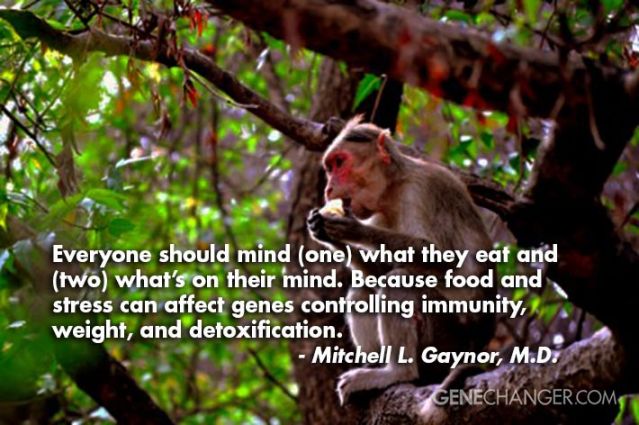
Memory
Epigenetics and Memory
Eating the right foods can boost your brain power.
Posted March 19, 2015

Every cell in the human body is under the command of DNA—the blueprint that determines whether you’ll be a righty or a lefty, short or tall, and many other things. And while our genetic makeup is fixed, our epigenes can be influenced to activate or deactivate certain segments of DNA—in essence changing how the “code” is read.
When it comes to the brain, glucose is an important metabolic substance that is needed and solely relied upon to carry out various neural functions and signals. The brain has 100 billion neurons, one quadrillion neural connections are made in the adult brain, and almost three-quarters of the body’s glucose is used by the brain. Is the brain a metabolically active organ or what?
However, the downside of requiring so much energy to execute all of its functions is that the brain is one of the most vulnerable organs in the body when it comes to our diet. Symptoms like confusion, irritability, and forgetfulness are masquerading as acceptable nuances of aging. But, in actuality, these symptoms are telltale signs of a greater underlying problem—an incongruity between the brain’s energy supply and energy demand.
What does that translate into, epigenetically speaking? We know that diet can impact gene expression. And studies show that diet can do so transgenerationally, meaning that your parents' (and even grandparents') diets can affect your epigenomic makeup by determining what genes are turned off or on.1
Various factors determine cognitive aging and why certain people develop neurodegenerative disease. Food, chemicals, and even stress can modify our epigenes. So by identifying external factors such as micronutrients that influence epigenes to prevent cognitive decline, it’ll be easier to thwart memory loss.
Chemical groups such as methyl and acetyl groups are responsible for turning gene segments off or on, respectively. Again, DNA wraps around histone proteins and these chemical groups, in turn, bind to the histone and modify DNA. When it comes to memory deficits, there is an enzyme called HDAC2 that has been shown to negatively impact the expression of genes involved in cognition. HDAC2 has been shown to remove acetyl groups, which, in essence, turns nearby genes “off”. A study published in Nature reports that blocking HDAC2 results in restorative cognitive function in mice.
Specifically, researchers from the Massachusetts Institute of Technology studied mutant mice that had amyloid-beta plaques (protein deposits characteristic of Alzheimer’s disease) and a significant loss of neurons (brain cells) and synapses (gaps between neurons). Yet, once the mice were given a drug to block all HDACs, they began to produce more synapses and demonstrated improvements in memory.
How is this possible? Well, the researchers were able to identify that HDAC2 levels are elevated in the hippocampus (associated with memory and learning) and temporal lobes; the enzyme specifically binds to memory genes in this region of the brain and weakens the expression of these genes. Although we know what HDAC2 does, how does it get out of control? The researchers were able to ascertain that both amyloid beta proteins and oxidative stress result in the overexpression of HDAC2. While the researchers used a specific drug that is tailored to target HDAC2, using ecogenetically smart foods—namely foods that fight oxidative stress and help bolster cognitive function—will help prevent and reverse memory problems.
Bolster Memory with Nutrients
Older adults are on the fast track toward becoming the largest segment of our society. A growing aging population means that there will be a proportional rise in age-related illnesses such as cardiovascular health problems and diabetes. What does this have to do with memory loss? Well, poor blood circulation in cardiovascular disease means that there’s a problem getting enough blood to the brain, in general, which means that the brain isn’t able to obtain maximal amounts of energy. And diabetes means that there’s a problem getting the brain’s main energy source—glucose—into brain cells. Studies have shown that nutritional deficiencies are linked to cognitive decline. Eating foods that contain these micronutrients, as well as taking supplements, will help replenish the low levels of necessary vitamins, minerals, and other nutrients.
A series of randomized, double-blind, placebo-controlled trials found that herbs and nutrients play a beneficial role in improving mood and memory. One of the supplements used in the series of trials was a plant extract containing flavonoids called Enzogenol® Pinus Radiatabark extract. It was administered to a small pool of older adult men with or without vitamin C. Greater improvements in cognition were demonstrated in the vitamin C supplemented group.
Your brain responds to bioactive nutrients. Omega-3 fats such as cold-water fish and oils have been shown in studies to lower the risk of Alzheimer's disease. Diets high in saturated fat are associated with memory loss, whereas diets rich in omega-3 fatty acids (e.g., wild salmon, trout) reduce this risk. We’ve all heard that age-related cognitive decline and fatigue are inevitable parts of growing old. And this is true if you program your genes to create this. However, there’s an abundance of ecogenetic food that will prevent and treat memory loss. A Mediterranean diet is rich in olive oil, fish, fruits, vegetables, and nuts—all of which significantly reduce age-related dementia. In the journal Neurology, researchers found that older adults who consumed a diet that was rich in vitamins B, C, D, E, and omega-3 fatty acids scored better on cognitive tests and had less brain shrinkage (a sign obtained through radiologic imaging associated with Alzheimer's disease). The researchers of this study measured 30 nutrient biomarkers, and they found that vitamins and omega-3 fatty acids were most consistently linked to brain health.
Butter and red meat are some of the foods that contribute to heart disease and obesity because they are high in saturated fats. And a study reports that a diet rich in saturated fats contributes to poor cognitive functioning. Instead, opt for unsaturated fats that are healthier for you such as avocados. Avocados have a high monounsaturated fat content, which is good for you and doesn’t clog your arteries. Just don’t over do it because they are a high-calorie food. Consider adding a quarter of a slice of avocado to your meal twice a week. Avocados also reduce blood pressure, which is another benefit because hypertension raises the risk of cognitive deficits.
In my upcoming book, The Gene Therapy Plan, which comes out April 21 through Viking, I give even more advice about ecogenetic foods that can help you not only boost brain power, but also ward off heart disease, diabetes, cancer, obesity, early aging, and more.



